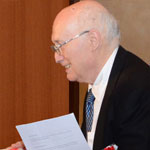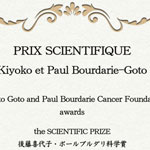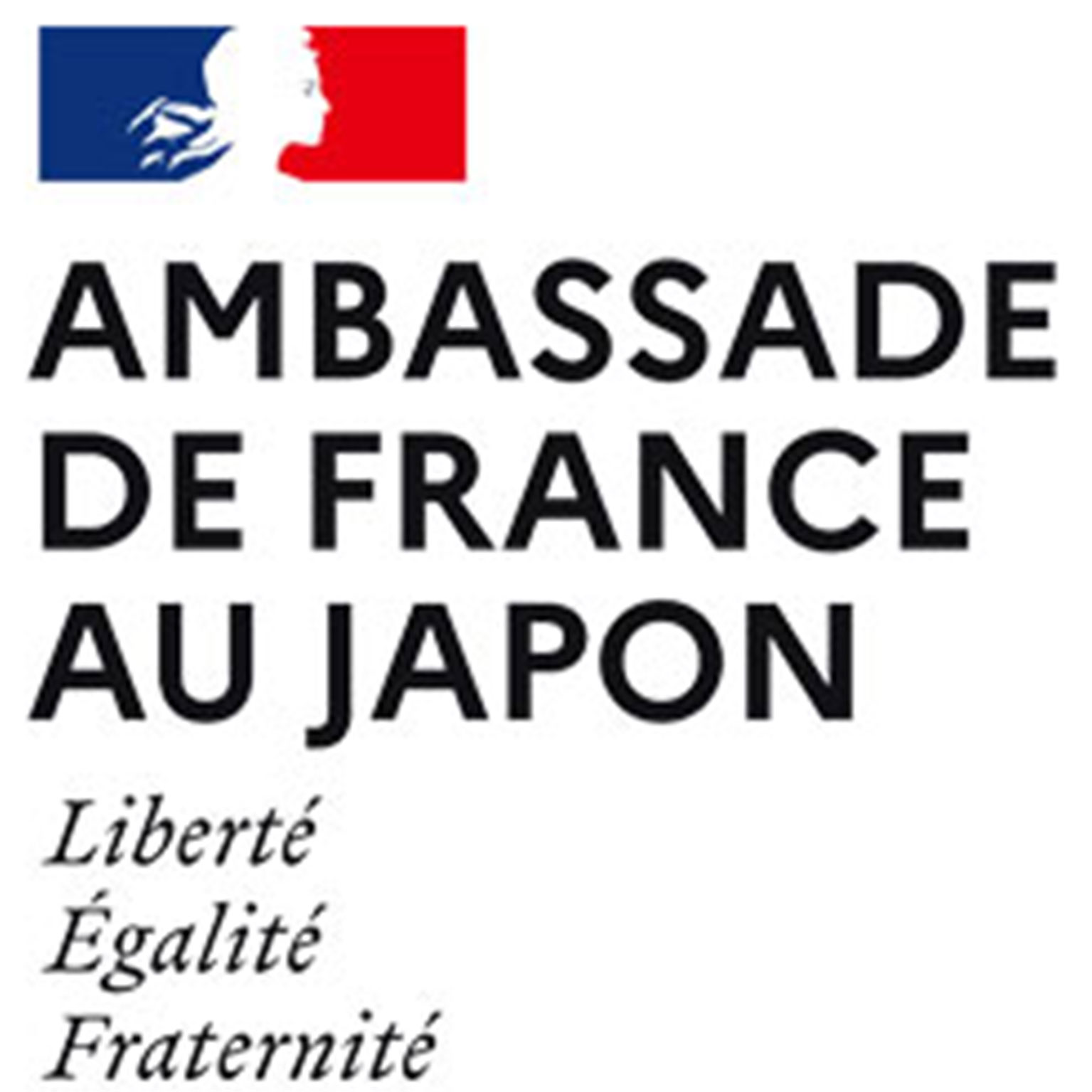- ホーム
- Lauréats et Cérémonie du Prix Scientifique Kiyoko Goto et Paul Bourdarie
- Lauréats du Prix Scientifique Kiyoko Goto et Paul Bourdarie
- 12ème édition du prix scientifique Kiyoko Goto et Paul Bourdarie(2023)
Lauréats du Prix Scientifique Kiyoko Goto et Paul Bourdarie
12ème édition du prix scientifique Kiyoko Goto et Paul Bourdarie(2023)
2024.4.1
| Title | Kiyoko Goto and Paul Bourdarie Scientific Prize |
|---|---|
| Laureate |
 Kentaro TANAKA, M.D., Ph.D. |
|
Associate Professor, Department of Respiratory Medicine, Graduate School of Medical Sciences, Kyushu University (position on April 1st 2024, Associate Professor, Department of Pulmonary Medicine, Graduate School of Medical and Dental Sciences, Kagoshima University) |
|
| Paper | Combination bezafibrate and nivolumab treatment of patients with advanced non–small cell lung cancer (Science Translational Medicine 2022;14 (675):eabq0021) |
| Reason for selection (Dr. Jun NAKAJIMA, Chairman of the Advisory Committee) |
Dr. Tanaka and colleagues conducted research, utilizing the secondary effect of the hyperlipidemia drug bezafibrate, which improves mitochondrial fatty acid oxidation, to extend the lifespan of CD8+ killer T cells. This research demonstrates an innovative potential to overcome resistance to cancer immunotherapy with PD-1 inhibitors. Furthermore, advisory committee members appreciated the safety, efficacy, and potential clinical significance of this treatment as evidenced by a Phase I clinical trial targeting non-small cell lung cancer patients. |
| Message from the Laureate |
I am honored to receive the prestigious Kiyoko Goto Paul Bourdarie Science Award and would like to express my sincere gratitude to all involved. PD-1 pathway inhibitors are immune checkpoint inhibitors that provide breakthrough therapeutic effects in various tumors, but it is an urgent issue to overcome the inevitable resistance acquired by cancer cells. Our research group focused on the energy production mechanism of killer T cells as a way to enhance the therapeutic effect of immune checkpoint inhibitors, and conducted a comprehensive search for drugs that can increase energy production by mitochondria, which are responsible for the metabolic mechanism necessary for functional activation and life extension. As a result, we identified bezafibrate, a hyperlipidemia drug, as a candidate and demonstrated in a preclinical model that bezafibrate enhances anti-tumor effects by improving the function of killer T cells when used in combination with immune checkpoint inhibitors. To confirm the results of these animal studies in humans, Kyushu University, in collaboration with Kyoto University and two other universities in Japan, designed and conducted an investigator-initiated Phase I clinical trial of nivolumab in combination with bezafibrate. The results showed that the combination therapy of nivolumab and bezafibrate increased the number of genes related to mitochondrial metabolism in killer T cells, and increased carnitine, a plasma metabolite reflecting increased fatty acid metabolism in the mitochondria of T cells, was observed in patients who responded to the combination therapy. Median progression-free survival in patients with wild-type EGFR was 7.5 months with this combination therapy, approximately three times longer than with nivolumab monotherapy previously reported. The results of this clinical trial confirmed that the enhancement of killer T cell energy production and subsequent improvement in killer T cell function observed in preclinical models with the combination of immune checkpoint inhibitors and bezafibrate also occurs in humans. This is the first report of a treatment targeting the metabolic modification of killer T cells, and I believe this is an originality of this study. I believe that our results are fundamental findings that will lead to the clinical development of innovative new drugs to enhance the efficacy of immune checkpoint inhibitors in advanced cancers and to overcome resistance to these drugs. Finally, I would like to express my deepest condolences to the late Mrs. Kiyoko Goto and Mr. Paul Bourdarie, the founders of this prestigious scientific award, and thank them once again for bestowing it upon me. |
| Title | Kiyoko Goto and Paul Bourdarie Scientific Prize |
|---|---|
| Laureate |
 Fumihiro SHOJI, M.D., Ph.D. |
| Chief of Thoracic Oncology, National Hospital Organization Kyushu Cancer Center | |
| Paper | Gut microbiota diversity and specific composition during immunotherapy in responders with non-small cell lung cancer (Frontiers in Molecular Bioscience 2022, 9:1040424) |
| Reason for selection (Dr. Jun NAKAJIMA, Chairman of the Advisory Committee) |
Dr. Shoji and colleagues discovered a correlation between the efficacy of immune checkpoint inhibitors (ICI) in non-small cell lung cancer (NSCLC) treatment and the types and distribution of gut bacteria. They observed significant differences in the composition of gut microbiota between ICI responders and non-responders among NSCLC patients. This study, elucidating the relationship between gut microbiota diversity and response to immunotherapy, has the potential to provide new biomarkers for future cancer immunotherapy strategies. The advisory committee members evaluated this paper for its relevance to the ongoing development of research in this field. |
| Message from the Laureate |
We have conducted basic/clinical research to improve the survival of lung cancer patients. Especially, we have investigated the host immunity in lung cancer patients. Several studies about the predictive biomarker of the cancer immunotherapy were mainly based on the “tumor” factors such as intra-tumoral PD-L1 protein expression, tumor mutation burden, and microsatellite instability, however, the definite biomarker has not yet been discovered. Recently, “host” factors including tumor infiltrating lymphocytes or host microbiome are highlighted. Now, the studies about the significance of the host microbiome including gut, oral and lung microbiome in lung cancer patients, are actively promoted. Host immunity is clearly associated with the response to cancer immunotherapy, and the internal microbiome is regarded as a controlling factor of host immunity, which supported our recent finding that the pretreatment host immune-nutritional condition was a prognostic biomarker for lung patients who received cancer immunotherapy. Therefore, the microbiome has been emphasized as a predictive biomarker of cancer immunotherapy mainly based on reports from the US or Europe. Remarkably, there are definite differences in the microbiome composition among ethnicities, therefore, it is important to clarify the correlation between hot microbiome and cancer immunotherapy response in Japanese lung cancer patients. In the present study, we reported that high gut microbiome diversity and the presence of specific microbes such as the genus Blautia and order RF32 unclassified were significantly correlated with the therapeutic response to cancer immunotherapy in Japanese lung cancer patients. This study revealed a strong association between gut microbiota diversity and cancer immunotherapy response in Japanese lung patients. Moreover, specific gut microbiota compositions may influence the cancer immunotherapy response. These findings might be useful in identifying biomarkers to predict cancer immunotherapy response, as well as in developing biotic therapies to enhance the cancer immunotherapy response. Now, our 3 different prospective studies are in progress. We considered the present study became the basis for ongoing novel research about gut microbiome in lung cancer above, therefore, we applied “Kiyoko Goto and Paul Bourdarie Cancer Foundation”. We would like to use the prize money by “Kiyoko Goto and Paul Bourdarie Cancer Foundation” as follows; 1)The establishment of simplified method (ex. Gut microbiome multi-Panel testing) detecting “Key gut microbiome” as the predictive biomarker of cancer immunotherapy discovered by our prospective studies. 2)Further study for the clarification of lung carcinogenesis mechanism through both lung microbiome and gut microbiome (the new concept called “lung-gut axis”). |





